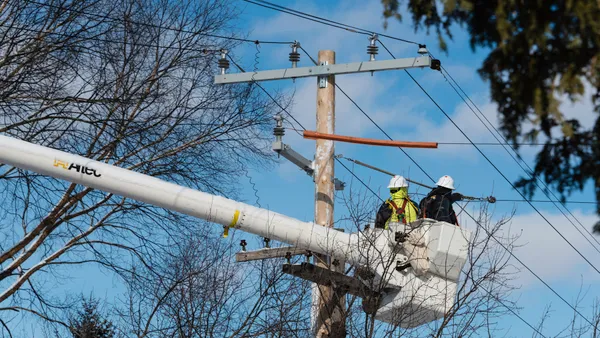Dive Brief:
- The New York General Assembly voted 96-43 on Wednesday to approve a bill that would require the state to eliminate economy-wide greenhouse gas pollution by 2050, Inside Climate News reports.
- The bill would require the state to cut GHG emissions 25% below 1990 levels by 2025, 50% by 2030, and 80% by 2045 on the way to a complete phase-out by 2050. It would also establish a 50% renewable portofolio standard by 2030, though some environmentalists have interpreted the bill as a de facto 100% renewables mandate.
- The bill now moves on to the state Senate, where it faces longer odds. While the General Assembly is comprised of 104 Democrats and 44 Republicans, the state Senate has a 32-31 split, with the Democrats holding the slight majority.
Dive Insight:
The New York bill, introduced by members of the state's Climate Change Work Group, is the single most ambitious piece of climate legislation passed in a house of a U.S. state legislature, Inside Climate News points out.
The bill would direct the Department of Environmental Conservation to first determine the economy-wide level of human-sourced greenhouse gas pollution in 1990. It would then ratchet the emissions requirement down until 2050, when 100% of those emissions would be eliminated.
Along the way, the bill sets renewable energy targets for utilities of 27% by 2017, 30% by 2020, 40% by 2025, and 50% by 2030. When it was introduced, the executive director of Environmental Advocates of New York said the bill "establishes that 100% of New York’s energy will come from clean, renewable sources by 2050."
While the exact level of 1990 emissions has yet to be determined, it appears it would require the electricity sector in the state to completely eliminate greenhouse gas pollution — not just carbon, but also methane and other pollutants. A 2014 state report reveals that GHG pollution from the power sector was higher in that year than it is today.
The bill does not establish a method for reducing greenhouse gas pollution, putting off those decisions to considerations of measures like a carbon tax, according to Inside Climate News.
Though the measure passed the General Assembly by a wide margin, the state Senate will present a greater challenge. The Democrats hold only a one-seat majority, and there are only a few days left before legislators adjourn for the summer on June 16.
The bill has now been referred to the Senate committee on environmental conservation and will go from there.














